10 Best Sales Tracking Software For Your Sales Team
51% of salespeople abandon prospects after one conversation but businesses that nurture leads sell 50% more than those that don’t. This clearly shows the power of effort. Staying on top of your metrics in the competitive sales world is crucial. But with endless emails, phone calls, and mountains of data to sort through, it can take time to manage everything effectively. Manually tracking leads, deals, and communication can quickly become overwhelming, hindering your team’s ability to close deals.
The good news is there’s a way to streamline your sales process and boost your win rates. Sales tracking software can be a game-changer for your team. These powerful tools can automate tasks, centralize data, and provide valuable insights to help you close more deals.
This blog post will reveal 10 of the best sales tracking software options.
We’ll break down their features, benefits, and pricing to help you find the perfect fit for your sales team.
So, ditch the spreadsheets and get ready to watch your sales game.
Table of Content
- What Is Sales Tracking?
- Why Does Your Business Need Sales Tracking?
- What Is Sales Tracking Software?
- Why Is Sales Tracking Software Important?
- What Should You Track Using Sales Tracking Software?
- How SalesBlink Helps With Tracking Emails?
- Top Sales Tracking Software
- Find the Perfect Sales Tracking Fit
- FAQs
What Is Sales Tracking?
Imagine simultaneously juggling multiple sales prospects with emails, phone calls, and meetings, keeping track of everything manually can be difficult. Sales tracking software is like having a super-powered assistant for your sales team.
Sales tracking software centralizes all your customer data and interactions in one place. This gives you a clear view of your sales pipeline, allowing you to see which leads are progressing and which need attention. These tools can also automate tasks like sending follow-up emails and scheduling meetings, freeing up your team’s time to focus on closing deals.
Simply put, tracking sales helps you understand and enhance how you close deals. By monitoring your sales data, you can see what you’re good at, improve your methods, and close more sales.
Why Does Your Business Need Sales Tracking?
Ever feel like you’re flying blind regarding your sales performance? Sales tracking software can be the key to gaining clarity and boosting your bottom line. Here’s why your business needs it:
1. See the Big Picture
Sales tracking gives you a real-time view of your sales pipeline. You can see how many leads you have at each stage, identify bottlenecks, and adjust your strategy accordingly. Imagine knowing which leads are most likely to convert – that’s powerful information!
2. Boost Efficiency
Ditch the spreadsheets and manual data entry. Sales tracking software automates repetitive tasks, freeing up your team’s time to focus on what matters most – closing deals. No more scrambling to remember who you spoke to last or the next step.
3. Data-Driven Decisions
Sales tracking provides valuable insights into your sales performance and you can see which marketing channels generate the most leads, which sales reps perform best, and which products or services sell the most. This data empowers you to make informed decisions to optimize your sales strategy.
4. Improved Forecasting
You can make more accurate sales forecasts with historical sales data at your fingertips. This lets you predict revenue, better plan resources, and avoid unpleasant surprises.
Sales tracking software is like having a crystal ball for your sales team. It illuminates what’s working and what’s not, allowing you to make smarter decisions and ultimately achieve your sales goals.
What Is Sales Tracking Software?
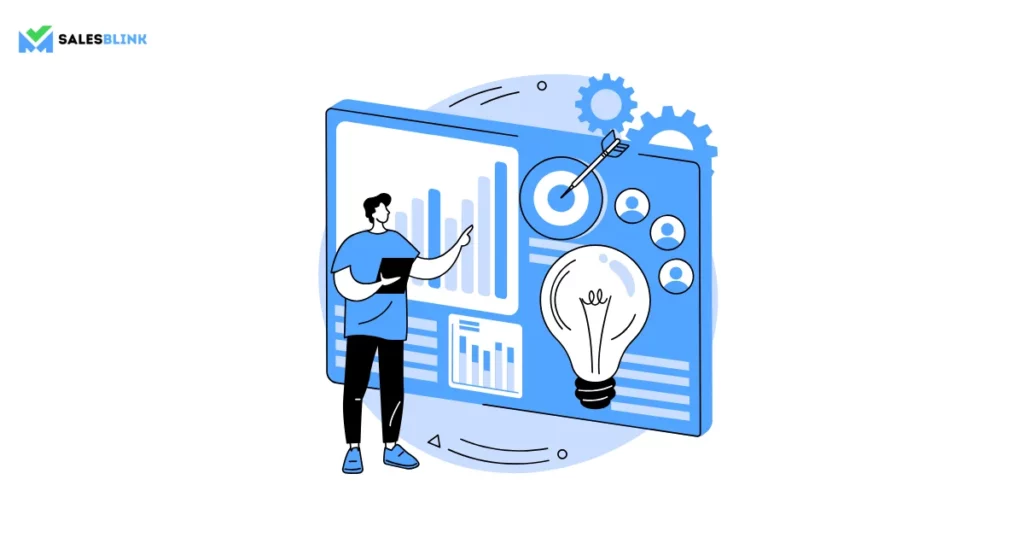
Businesses use sales tracking software to monitor and enhance their sales activities. The software automates many tasks in sales. It tracks potential customers, manages potential deals, and predicts future sales. This software gives useful information about sales data. It helps businesses find ways to do better and increase sales.
For instance, sales tracking software can show which sales are performing well and which ones need more help. It can also reveal which marketing campaigns generate the most leads and which could be more effective. By providing this information, sales tracking software helps businesses streamline their sales processes and boost their bottom line.
Why Is Sales Tracking Software Important?

Clear View of the Sales Pipeline
Imagine trying to navigate a busy city without a map. Sales tracking software acts like a map for your sales team, giving them a clear view of the entire sales process. It’s important because it helps businesses in several key ways. It provides visibility into the sales pipeline. This lets managers see how many potential customers are at each stage of the sales process, from initial contact to closing the deal. This allows them to identify bottlenecks that might slow down sales and adjust their strategy accordingly.
Improve Sales Forecasting
Sales tracking software helps with forecasting. By analyzing past sales data, businesses can more accurately predict future sales. This is crucial for making sound financial decisions, such as how much inventory to stock or how many salespeople to hire.
Boosted Sales Team Performance
This software helps improve sales team performance. By tracking individual and team metrics, managers can identify which salespeople excel and which need extra support. This allows them to provide targeted coaching and improve overall sales effectiveness. In short, sales tracking software is a powerful tool that helps businesses close more deals, make better decisions, and ultimately, grow their revenue.
What Should You Track Using Sales Tracking Software?
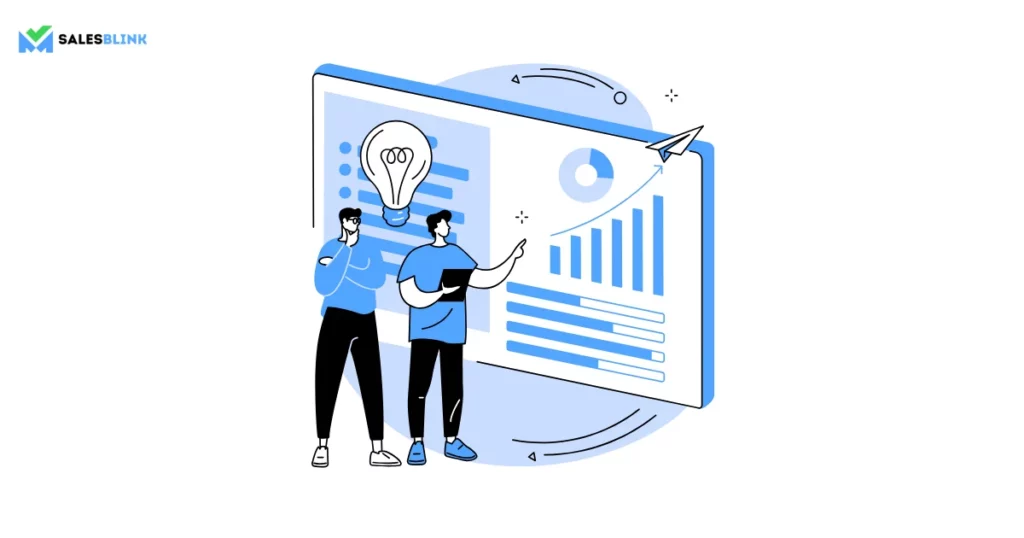
In the fast-paced sales world, clearly understanding your performance is essential for success. Sales tracking software is your command center, providing valuable insights into every sales process step. But with so much data available, what should you track? Here are eight key metrics that sales tracking software can help you monitor and why they matter:
1. Conversion Rate
This reveals the percentage of leads that convert into paying customers. Is your sales team effectively turning initial interest into closed deals? A strong conversion rate indicates a well-oiled sales process, while a low rate suggests areas for improvement.
2. Lead Tracking
Imagine a leaky bucket, and you wouldn’t want to lose any potential customers, right? Lead tracking lets you watch how leads move through sales steps, so no one gets left behind. You can see which leads need more attention and take care of them properly.
3. Revenue Per Sale
Not all deals are created equal. Tracking revenue per sale provides a clear picture of how much income each sale generates. This can help you identify high-value products or services and tailor your sales strategy to maximize profitability.
4. Sales Forecasting
Looking into the future is a superpower in the business world. Sales forecasting allows you to predict sales based on data and current trends. This vital information helps make informed decisions about resource allocation, inventory management, and staffing needs.
5. Total Addressable Market
This metric defines the overall market size for your product or service. Knowing your total addressable market helps you set realistic sales goals and identify untapped customer segments. Think of it as the size of the pie you’re aiming for a slice of – the bigger the pie, the greater the potential revenue.
6. Activity Reports
Just like tracking your steps helps you monitor your fitness goals, activity reports track the actions of your sales team. These reports reveal how many calls are being made, emails sent, and meetings held. Analyzing activity levels can help you identify areas where your team needs additional training or resources.
7. Funnel Reports
The sales funnel visualizes a lead’s journey from initial contact to becoming a customer. Funnel reports provide insights into where leads drop off in the sales process. Do they need more interest during the initial qualification stage or help close the deal? Funnel reports help identify bottlenecks and optimize your sales process for smoother lead flow.
8. Won (and Lost) Opportunities
Every closed deal represents a victory, but valuable lessons can be learned from lost opportunities. Tracking wins and losses allows you to analyze what works and what doesn’t. Understanding why deals are lost can refine your sales pitch, identify deal breakers, and improve your win rate.
How SalesBlink Helps With Tracking Emails?
Have you ever hit send on an important email and wondered if it landed in the inbox? SalesBlink can ease your worries by acting as your email buddy. It helps you track key email metrics, giving valuable insights into how recipients engage with your messages.
So, how does it work? SalesBlink utilizes an innovative technique. When you compose an email with SalesBlink enabled, it discreetly adds a tiny, invisible pixel to the email body. This pixel is completely harmless and undetectable by the recipient. Here’s the magic: when the recipient opens your email, their email client (like Gmail or Outlook) loads the pixel in the background. SalesBlink registers this load as an “open,” letting you know the recipient has seen your message.
But SalesBlink continues. It can also track replies. When a recipient hits “reply” and their email client composes a response, it often fetches the original email content to quote. SalesBlink can detect this and notify you that a reply is underway before it lands in your inbox. This real-time feedback keeps you in the loop and allows you to prioritize your follow-ups accordingly.
By tracking opens and replies, SalesBlink empowers you to understand recipient engagement and tailor your outreach strategy. Did your email get opened, but have you yet to reply? A follow-up email with a different approach may be needed. SalesBlink equips you with the data to make informed decisions and improve your email communication effectiveness.
Top Sales Tracking Software
A robust sales pipeline is paramount to success in today’s competitive business world. However, managing that pipeline effectively can be a complex task. That’s where sales tracking software comes in. These powerful tools provide a centralized platform to track leads, manage deals, and gain valuable insights into your sales process. Choosing the right sales tracking software can feel overwhelming with many available options. Here’s a breakdown of 10 top contenders to help you find the perfect fit for your business needs:
1. HubSpot CRM
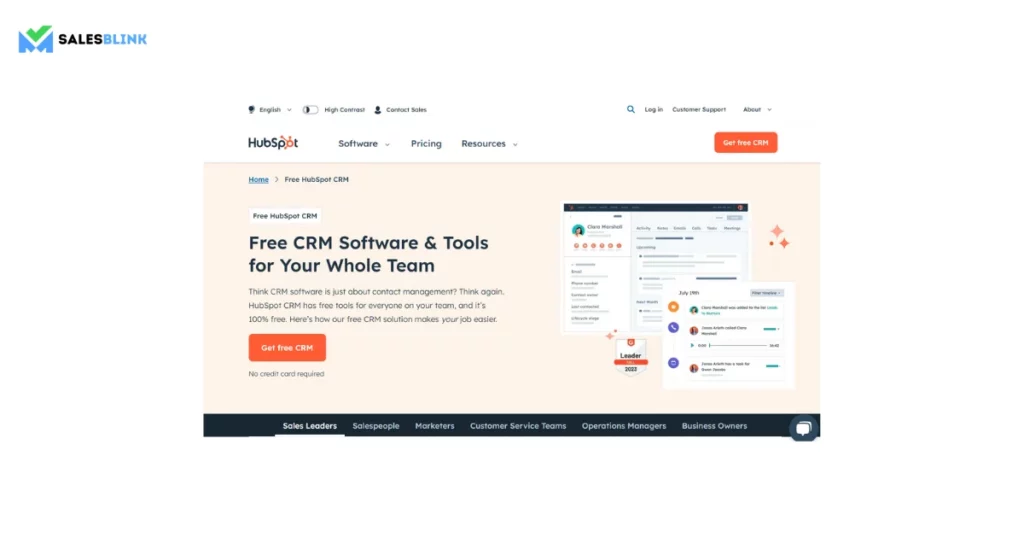
HubSpot offers a free forever CRM plan, making it a budget-friendly for startups and small businesses. It boasts a user-friendly interface and integrates seamlessly with other HubSpot products for marketing and customer service. HubSpot excels at lead management with automated lead scoring and email tracking features. However, its free plan has limitations on customization and automation capabilities.
Pricing: The paid plan starts at $20 per month.
2. Zendesk Sell
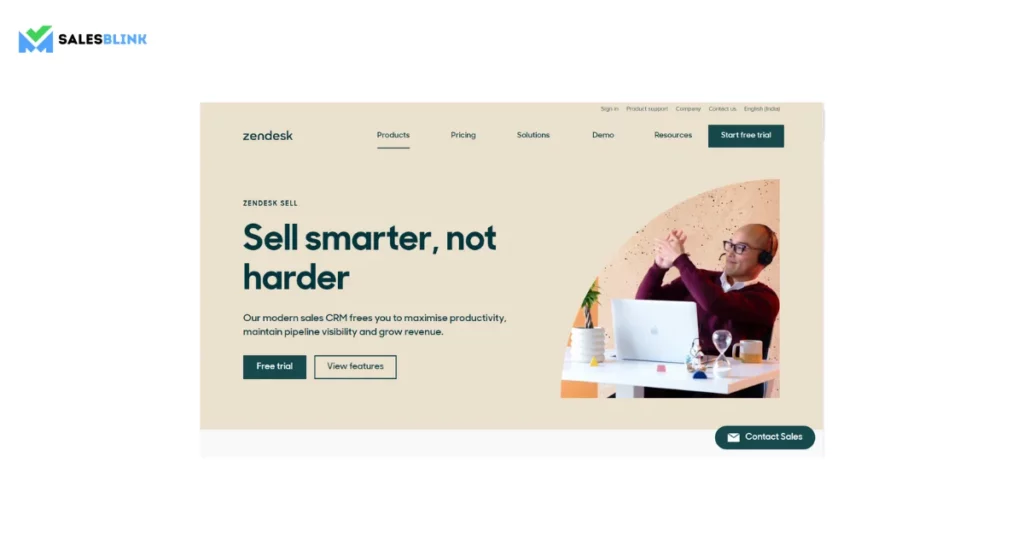
Zendesk Sell is designed for easy use, and teams are looking for a user-friendly tool like it. It provides strong contact management tools and integrates with other Zendesk products. However, Zendesk Sell’s report options could be improved compared to some similar tools.
Pricing: The paid plan starts at $25 per month.
3. Agile CRM
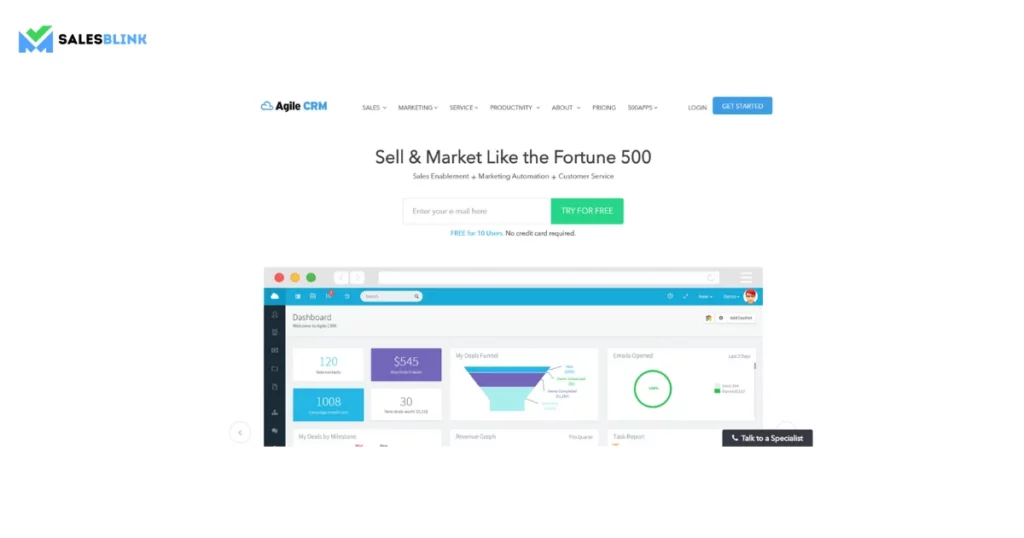
Agile CRM is another budget-friendly option that packs a punch. It boasts a gamification element, keeping sales teams motivated and engaged through leaderboards and goal tracking. Agile CRM offers a free plan with contact management, pipeline management, and email integration. However, advanced features like marketing automation require paid upgrades.
Pricing: The paid plan starts at $8.99 per month.
4. Close CRM
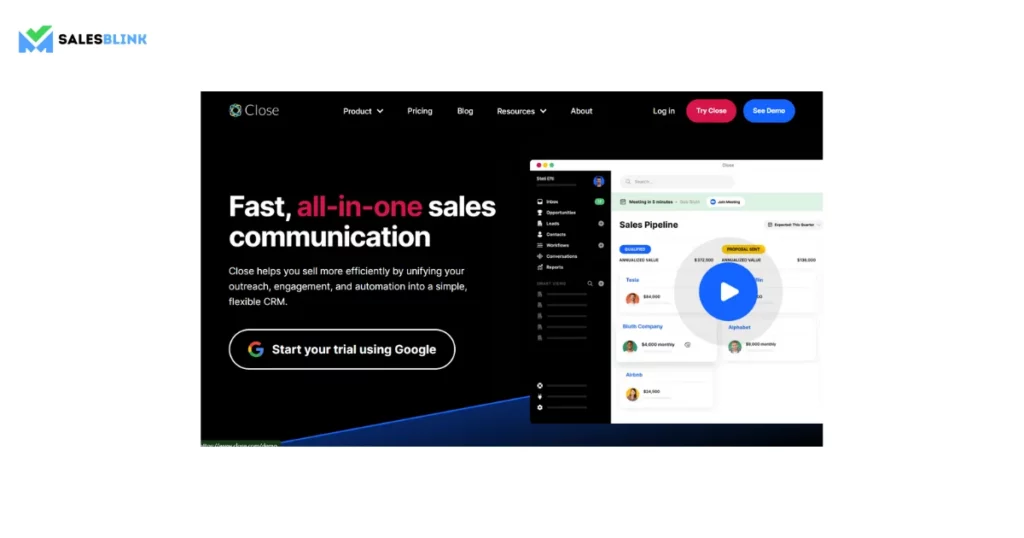
Built specifically for sales teams, Close CRM streamlines the sales process with built-in calling and voicemail-dropping features. Its user interface is clean and intuitive, ideal for teams prioritizing efficiency. Close CRM offers a free trial and paid plans with features like call recording, sales automation, and advanced reporting. However, some broader customer relationship management (CRM) functionalities may need to be found on other platforms.
Pricing: The paid plan starts at $59 per month
5. Pipedrive
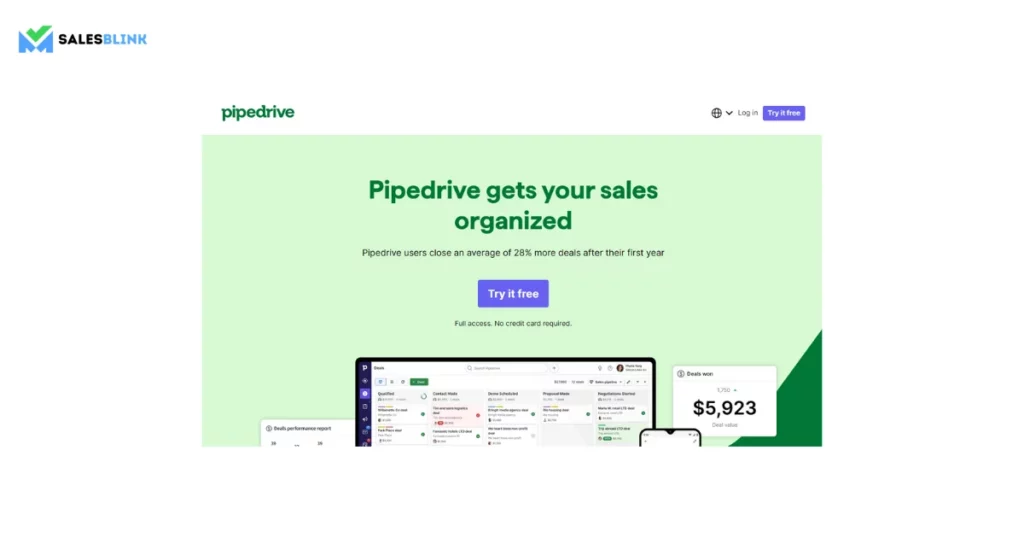
Pipedrive is a visual sales CRM that utilizes a sales pipeline view, making it easy to track deal progress at a glance. It’s known for its drag-and-drop functionality and intuitive interface, facilitating a smooth learning curve. Pipedrive offers a paid plan and free trial with features like email integration, lead scoring, and custom pipelines. However, its reporting capabilities may be less in-depth compared to some competitors.
Pricing: The paid plan starts at $14 per month
6. Salesforce CRM
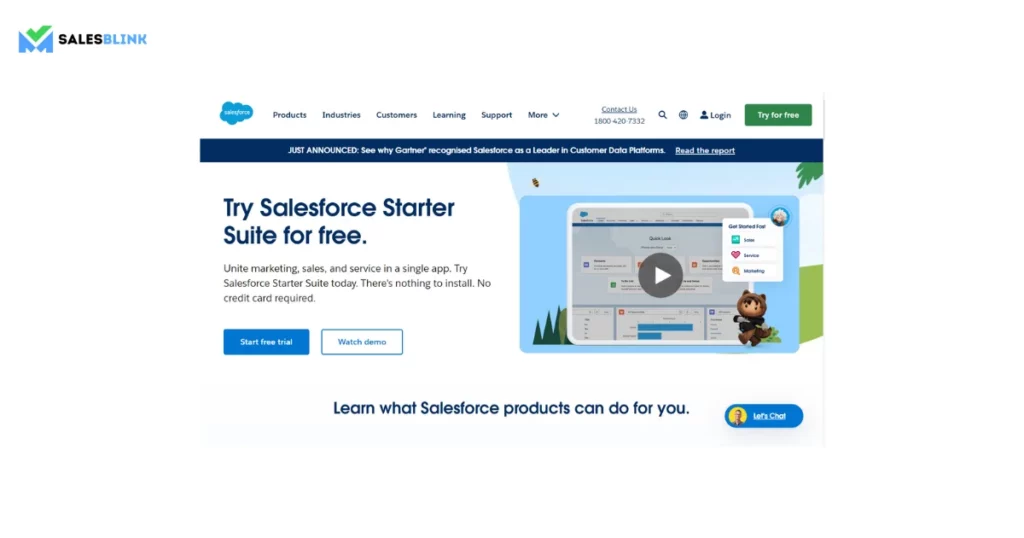
The industry giant Salesforce CRM is a comprehensive platform offering many features and functionalities. It caters to large enterprises with complex sales processes and extensive customization needs. Salesforce offers a variety of paid plans with features like sales automation, advanced reporting, and industry-specific solutions. However, its complexity can make it overwhelming for smaller businesses, and its cost can be a significant investment.
Pricing: The paid plan starts at $25 annually
7. Zoho CRM
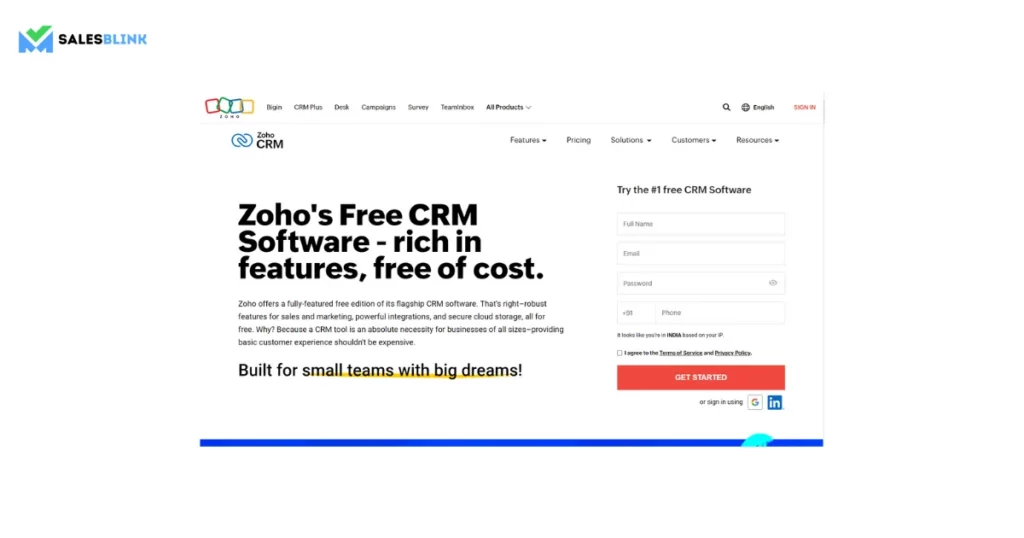
A well-rounded CRM solution, Zoho CRM offers a good balance of features and affordability. It caters to businesses of all sizes with various functionalities, from lead management to marketing automation. Zoho CRM offers free and paid plans with features like sales forecasting, workflow automation, and mobile access. However, its interface could be clearer compared to some competitors.
Pricing: The paid plan starts at Rs1300 per month
8. Salesflare
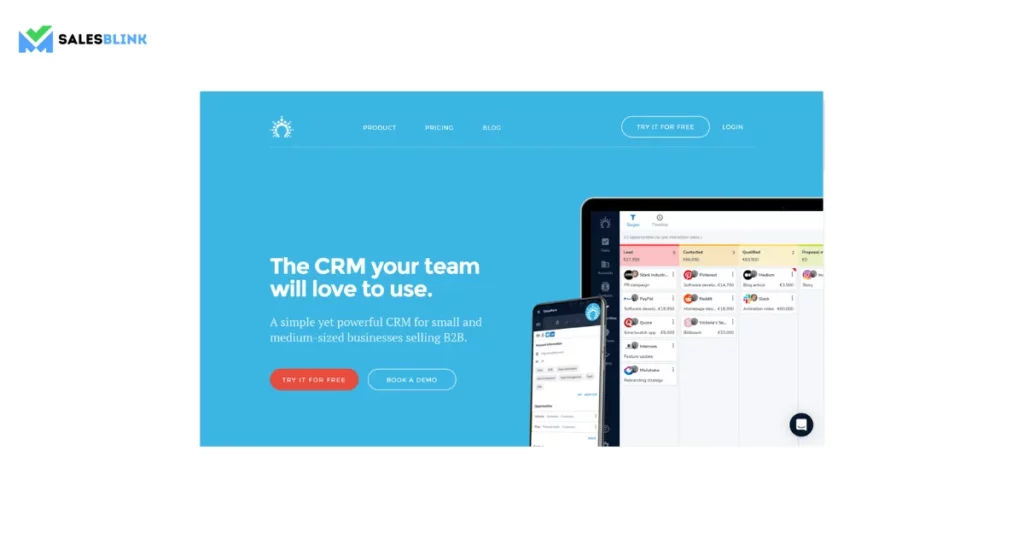
Salesflare takes a unique approach by automatically capturing data from emails and calendars, eliminating the need for manual data entry. This makes it a great option for sales teams that prioritize efficiency. Salesflare offers free and paid plans with features like email tracking, lead scoring, and integrations with popular business tools. However, its customization options may be limited as compared to some competitors.
Pricing: The paid plan starts at $29 per month
9. Copper
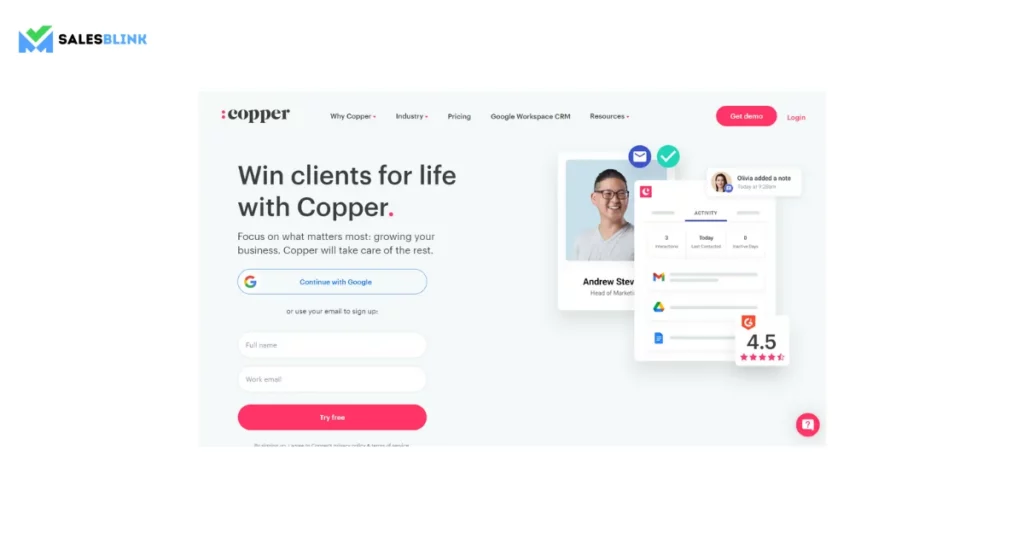
Copper is a Google Workspace-native CRM that seamlessly integrates with Gmail and G Suite applications. This makes it ideal for businesses relying heavily on Google’s productivity suite. Copper offers a free trial and paid plans with features like contact management, opportunity management, and email tracking. However, its reporting capabilities may be less extensive compared to some competitors.
Pricing: The paid plan starts at $29 per month
10. Freshsales
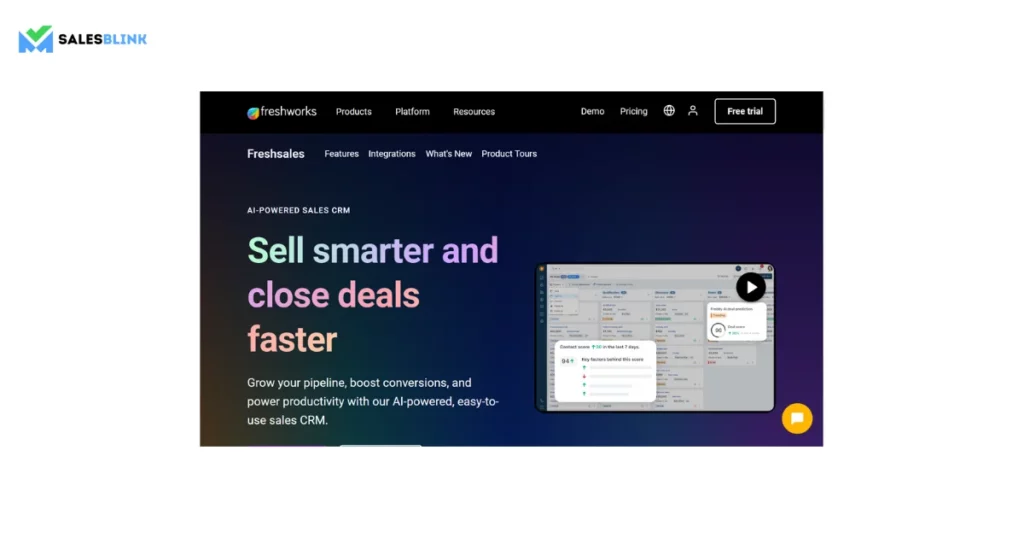
Freshsales is a cloud-based CRM solution that offers a user-friendly interface and strong integrations with other Freshworks products for a unified customer experience platform. It suits businesses of all sizes and prioritizes collaboration within sales teams. Freshsales offers free and paid plans with features like lead scoring, web forms, and phone integration. However, its automation capabilities may be less advanced compared to some competitors.
Pricing: The paid plan starts at Rs899 per month
Choosing the right sales tracking software is a crucial decision. When evaluating these options, consider your specific needs, budget, and team size.
Find the Perfect Sales Tracking Fit
Keeping track of leads, deals, and data in today’s competitive sales landscape can feel overwhelming. Sales tracking software swoops in as a superhero, offering a centralized platform to streamline your sales process and boost your win rates.
Choosing the right sales tracking software can be daunting, with many options available. This guide explored 10 top contenders, each with unique strengths and functionalities.
Remember, the ideal solution depends on your needs. When evaluating these options, consider your budget, team size, and desired features. Feel free to take advantage of free trials and demos to understand the software before deciding.
Implementing the right sales tracking software can empower your sales team with valuable insights, improve efficiency, and close more deals. So ditch the spreadsheets, embrace data-driven decisions, and watch your sales soar.
FAQs
Many small businesses rely on spreadsheets or even paper records to track sales. This can be time-consuming and error-prone. Sales tracking software automates tasks and offers valuable insights, making sales management more efficient.
The best sales tracking software depends on your needs, budget, and team size. This guide explored 10 options but researched and considered features, pricing, and free trials to find the perfect fit for you.
Sales tracking software offers various features, including lead management, pipeline management, deal tracking, reporting, and automation. Some even integrate with email and calendar tools.







